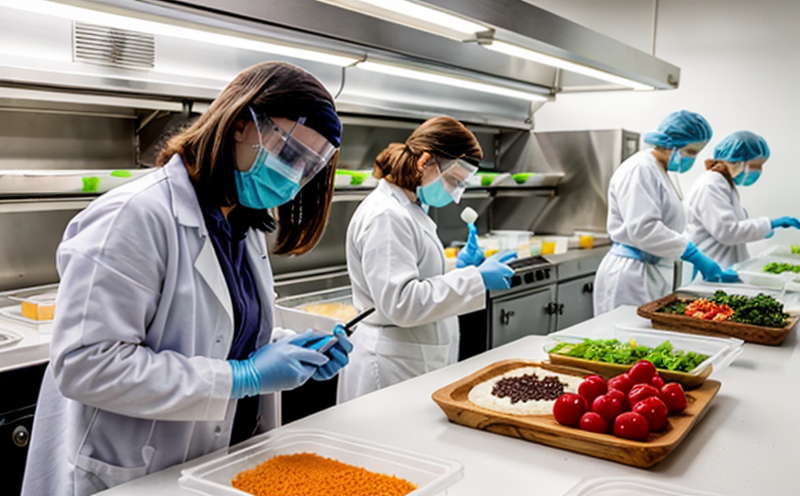EN 12323 Shigella Detection Testing in Ready-to-Eat Foods
The detection of Shigella spp. in ready-to-eat foods is a critical aspect of food safety, especially for products consumed without further cooking or processing. Shigella bacteria are the causative agents of bacillary dysentery and can lead to severe gastrointestinal distress if not properly controlled during production and distribution.
The European standard EN 12323 provides a harmonized approach to detecting Shigella spp. in ready-to-eat foods, which includes products such as salads, prepared meats, and other items typically consumed without further preparation. This method ensures that food manufacturers and processors adhere to stringent hygiene standards and comply with regulatory requirements.
The testing process outlined in EN 12323 involves several stages, starting from sample collection through to final confirmation of Shigella presence. Samples are typically collected from the production line or storage areas where ready-to-eat foods are stored before distribution. These samples undergo rigorous pre-treatment procedures to ensure they meet the required standards for analysis.
The standard specifies the use of enrichment broth followed by plating on selective media, which allows for the isolation and identification of Shigella colonies. The entire process is meticulously controlled to minimize contamination risks and ensure accurate results. This method ensures that even trace amounts of Shigella are detected, thus safeguarding public health.
Accurate detection is crucial for maintaining the integrity of food safety systems. Proper implementation of EN 12323 helps prevent outbreaks by identifying contaminated products early in the supply chain. This proactive approach not only protects consumers but also enhances a company's reputation and compliance with international regulations.
The standard’s robust protocols ensure that laboratories conducting these tests adhere to consistent practices, leading to reliable results across different facilities. Compliance with EN 12323 is essential for maintaining high standards of hygiene in the food industry, thereby protecting public health and ensuring consumer confidence.
| Applied Standards |
|---|
| EN 12323: Microbiological examination of ready-to-eat foods - Detection of Shigella spp. in processed products. |
Applied Standards
The testing process for detecting Shigella spp. in ready-to-eat foods is regulated by the European standard EN 12323, which provides a comprehensive framework for microbiological examination. This includes detailed procedures for sample collection, pre-treatment, and final confirmation of Shigella presence.
The standard emphasizes the importance of using appropriate enrichment broths to enhance the growth of Shigella spp., followed by plating on selective media. This method ensures that even low concentrations of Shigella are detected, thereby providing reliable results for regulatory compliance.
| Applied Standards |
|---|
| EN 12323: Microbiological examination of ready-to-eat foods - Detection of Shigella spp. in processed products. |
| ISO 6876: Microbiological Examination of Foods and Feedstuffs - Isolation and Identification of Pathogenic Bacteria |
Quality and Reliability Assurance
- Meticulous adherence to EN 12323 ensures consistent results across different laboratories.
- Use of certified reagents and media guarantees the reliability of test outcomes.
- Regular calibration of instruments ensures accurate detection of Shigella spp.
The quality assurance measures implemented by this testing service are designed to maintain high standards of reliability. Regular audits and internal reviews help identify and address any inconsistencies in the testing process, ensuring that all results meet international standards for accuracy and precision.
Avoiding cross-contamination is a critical aspect of maintaining the integrity of test results. Laboratories follow strict protocols for sample handling and storage to prevent contamination from other sources. This ensures that each sample tested represents an accurate reflection of its original state.
The reliability of these tests is further enhanced by the use of advanced instrumentation and software, which provide real-time data on the growth and identification of Shigella spp. The automated systems used in this process reduce human error while increasing efficiency and accuracy.
Competitive Advantage and Market Impact
- Compliance with EN 12323 provides a competitive edge by ensuring product safety and maintaining consumer trust.
- Prompt detection of Shigella spp. allows for quick corrective actions, minimizing potential health risks and reputational damage.
The implementation of EN 12323 in food microbiology testing offers significant competitive advantages to companies operating within the food industry. By adhering strictly to this standard, businesses can demonstrate their commitment to producing safe and high-quality products, thereby enhancing their market reputation.
Prompt detection of Shigella spp. allows for timely interventions that prevent the distribution of contaminated products. This proactive approach not only reduces the risk of outbreaks but also minimizes potential financial losses associated with product recalls or legal actions.
The ability to provide reliable and accurate test results is crucial in today’s highly regulated market environment. Compliance with international standards such as EN 12323 ensures that food manufacturers and processors are meeting the highest safety and quality standards, thereby gaining a competitive edge in an increasingly demanding marketplace.





